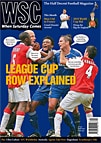 The response of the authorities, at the time and later, to the crush involving Manchester United supporters at Lens would have been all too familiar to those who watch English club sides abroad, says Adam Brown
The response of the authorities, at the time and later, to the crush involving Manchester United supporters at Lens would have been all too familiar to those who watch English club sides abroad, says Adam Brown
The problems experienced by some Manchester United supporters at their Champions League fixture in Lens may have attracted an unusual number of tabloid headlines, but they should not have come as a surprise to anybody.
United fans were crushed against fences when too many people were allowed into one area of Lens’s Stade Felix-Bollaert, which Lille use for the Champions League. Police and security inside the stadium reacted with tear gas and batons to the fans who, in a chilling echo of Hillsborough, began helping each other over the fences.
However, although this event was transmitted and commented on live – heightening its profile – it isn’t anything new, or even uncommon. Since English clubs returned to European competition in 1990 there has been a catalogue of instances, amounting to a serial violation of the civil liberties of travelling English football fans.
The litany includes Man Utd’s match at Galatasaray in 1993 (250 deported, six imprisoned); Norwich at Inter the same year (fans held without refreshment for hours on buses); Man Utd fans prevented from travelling to Barcelona in 1994 and crushed on entry to the Champions League final there in 1999; Chelsea fans arrested en masse and deported without appeal in Bruges in 1994; a near catastrophe when United visited Porto in 1997, with bullets fired by the police and cascades of fans forced down dangerous stairways; police charging at England fans when the national team played in Rome in 1997; and Liverpool fans abused in Strasbourg the same year. The numerous less serious incidents include a crush on entry at Lens the first time United played Lille there.
The Football Supporters’ Federation and their forerunner the FSA have regularly compiled reports on such incidents but, in contrast to improvements at international tournaments, this has been to little avail for travelling club fans. The FSF is now developing a permanent source of fans’ embassy-style information, planned to be part of the FSF ground guide, which will launch on their website soon.
There is a familiar pattern: a failure to relieve crowd congestion, poor grounds with fences and poor stewarding of the crowd on entry, causing turnstile crushes even when fans turn up early. Some police forces (those in Italy, Spain, Portugal and France, among others) seem to have a set response no matter what is actually happening in front of them – batoning those at the front, the least able to do anything about it and tear-gassing fans in enclosed spaces.
Incidents are often met by denial. The head of stadium security at Lens said: “There was not a problem of communication. From the moment we saw the supporters trying to pull on the railings, what interpretation we can make of that, as security guards? For me, it was violent behaviour.” There is also a general presumption of fan guilt in the media – Alan Green said the Lens problems weren’t as serious as fans suggested, just as he falsely accused United supporters of being the culprits in Porto. Such comments are often accompanied by the spectres of drunkenness and forged tickets – sometimes contributing factors, but rarely the cause. There also tends to be considerably more concern when players’ or officials’ families are affected, yet there remains almost nowhere for ordinary fans to go to get redress for maltreatment or injury.
The nub of the problem is that, despite all the reports submitted, almost nothing has been done to address the issue. The response to the Porto incident in 1997 was for the FA’s security chief to say “fans should watch it on TV” and Graham Kelly, then FA chief executive, responded to the FSA’s report by saying “your comments have been noted”. The Foreign Office and British embassies are routinely unsympathetic.
The European Sports Review, much trumpeted by Sports Minister Richard Caborn, calls for co-operation “in all matters relating to security for the maximum protection of the public”, yet this concentrates on eliminating hooliganism and does not even mention the kind of threat to fans’ safety we have seen in Lens and elsewhere. If our own representatives won’t stand up for English fans’ interests, is it any wonder these events continue to happen?
Adam Brown is a director of social research company Substance. Reports on past problems for travelling fans will be available here
From WSC 242 April 2007. What was happening this month